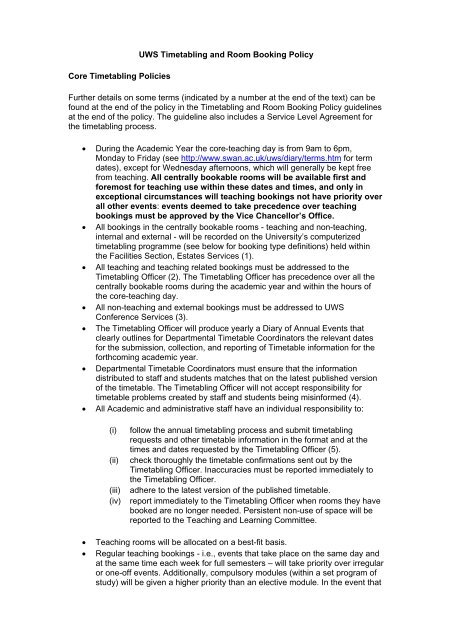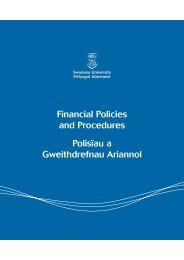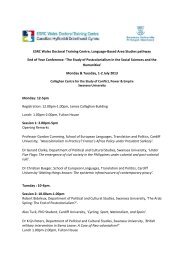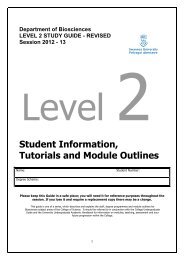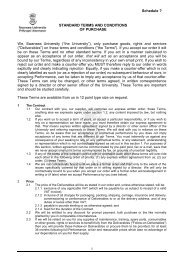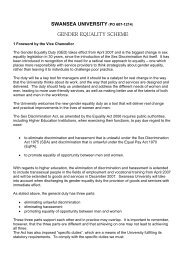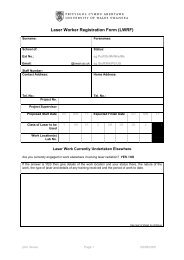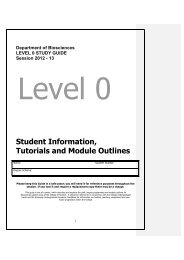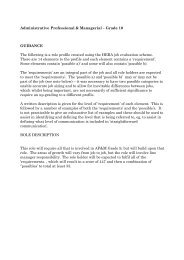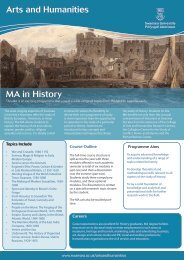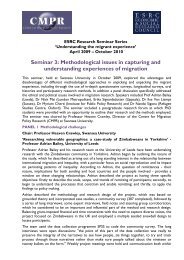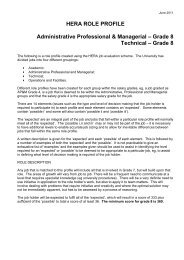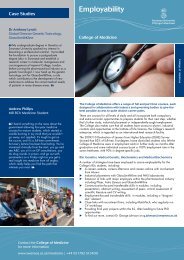UWS Timetabling and Room Booking Policy - Swansea University
UWS Timetabling and Room Booking Policy - Swansea University
UWS Timetabling and Room Booking Policy - Swansea University
You also want an ePaper? Increase the reach of your titles
YUMPU automatically turns print PDFs into web optimized ePapers that Google loves.
Core <strong>Timetabling</strong> Policies<br />
<strong>UWS</strong> <strong>Timetabling</strong> <strong>and</strong> <strong>Room</strong> <strong>Booking</strong> <strong>Policy</strong><br />
Further details on some terms (indicated by a number at the end of the text) can be<br />
found at the end of the policy in the <strong>Timetabling</strong> <strong>and</strong> <strong>Room</strong> <strong>Booking</strong> <strong>Policy</strong> guidelines<br />
at the end of the policy. The guideline also includes a Service Level Agreement for<br />
the timetabling process.<br />
• During the Academic Year the core-teaching day is from 9am to 6pm,<br />
Monday to Friday (see http://www.swan.ac.uk/uws/diary/terms.htm for term<br />
dates), except for Wednesday afternoons, which will generally be kept free<br />
from teaching. All centrally bookable rooms will be available first <strong>and</strong><br />
foremost for teaching use within these dates <strong>and</strong> times, <strong>and</strong> only in<br />
exceptional circumstances will teaching bookings not have priority over<br />
all other events: events deemed to take precedence over teaching<br />
bookings must be approved by the Vice Chancellor’s Office.<br />
• All bookings in the centrally bookable rooms - teaching <strong>and</strong> non-teaching,<br />
internal <strong>and</strong> external - will be recorded on the <strong>University</strong>’s computerized<br />
timetabling programme (see below for booking type definitions) held within<br />
the Facilities Section, Estates Services (1).<br />
• All teaching <strong>and</strong> teaching related bookings must be addressed to the<br />
<strong>Timetabling</strong> Officer (2). The <strong>Timetabling</strong> Officer has precedence over all the<br />
centrally bookable rooms during the academic year <strong>and</strong> within the hours of<br />
the core-teaching day.<br />
• All non-teaching <strong>and</strong> external bookings must be addressed to <strong>UWS</strong><br />
Conference Services (3).<br />
• The <strong>Timetabling</strong> Officer will produce yearly a Diary of Annual Events that<br />
clearly outlines for Departmental Timetable Coordinators the relevant dates<br />
for the submission, collection, <strong>and</strong> reporting of Timetable information for the<br />
forthcoming academic year.<br />
• Departmental Timetable Coordinators must ensure that the information<br />
distributed to staff <strong>and</strong> students matches that on the latest published version<br />
of the timetable. The <strong>Timetabling</strong> Officer will not accept responsibility for<br />
timetable problems created by staff <strong>and</strong> students being misinformed (4).<br />
• All Academic <strong>and</strong> administrative staff have an individual responsibility to:<br />
(i)<br />
(ii)<br />
(iii)<br />
(iv)<br />
follow the annual timetabling process <strong>and</strong> submit timetabling<br />
requests <strong>and</strong> other timetable information in the format <strong>and</strong> at the<br />
times <strong>and</strong> dates requested by the <strong>Timetabling</strong> Officer (5).<br />
check thoroughly the timetable confirmations sent out by the<br />
<strong>Timetabling</strong> Officer. Inaccuracies must be reported immediately to<br />
the <strong>Timetabling</strong> Officer.<br />
adhere to the latest version of the published timetable.<br />
report immediately to the <strong>Timetabling</strong> Officer when rooms they have<br />
booked are no longer needed. Persistent non-use of space will be<br />
reported to the Teaching <strong>and</strong> Learning Committee.<br />
• Teaching rooms will be allocated on a best-fit basis.<br />
• Regular teaching bookings - i.e., events that take place on the same day <strong>and</strong><br />
at the same time each week for full semesters – will take priority over irregular<br />
or one-off events. Additionally, compulsory modules (within a set program of<br />
study) will be given a higher priority than an elective module. In the event that
these priorities, including the principle of best fit, cannot help distinguish<br />
between competing room requests, the <strong>Timetabling</strong> Officer will report the<br />
problem to all involved parties, who will then negotiate an amicable solution.<br />
The <strong>Timetabling</strong> Officer will supply information on free slots or alternative<br />
rooms as requested, but will not act as arbitrator in room booking disputes.<br />
• During scheduled examination dates Examinations will have priority usage in<br />
the centrally bookable rooms.<br />
• Staff must not use rooms they perceive to be free of teaching without first<br />
requesting use of the room from the <strong>Timetabling</strong> Officer. <strong>Room</strong>s may be<br />
empty for a number of reasons, <strong>and</strong> may well be timetabled for use in future<br />
weeks. Illicit occupation of rooms is the main contributor to room<br />
clashes.<br />
• <strong>Booking</strong>s made by telephone must be supported in writing (by email or fax) by<br />
the person requesting the room. The <strong>Timetabling</strong> Officer will cancel any<br />
provisionally held booking for which written confirmation has not been<br />
received at least 14 days before the event takes place.<br />
• The <strong>Timetabling</strong> Officer will provide written confirmation of all bookings: staff<br />
<strong>and</strong> students must consider that bookings are not confirmed until written<br />
confirmation is received.<br />
• The <strong>Timetabling</strong> Officer cannot guarantee that a preferred room will be<br />
available for chosen timeslots. Please ensure that you have received written<br />
confirmation of your booking before confirming venues with attendees.<br />
• Annual events must be booked <strong>and</strong> confirmed in writing every year: the<br />
<strong>Timetabling</strong> Officer will not carry over bookings from one year to the next.<br />
• The <strong>Timetabling</strong> <strong>and</strong> <strong>Room</strong> <strong>Booking</strong> Programme will not allow more than one<br />
class to be scheduled in a room at any one time – i.e., the programme will not<br />
allow room booking clashes (6).<br />
• The <strong>Timetabling</strong> Officer will only accept bookings from official student<br />
societies – i.e., those societies affiliated to <strong>Swansea</strong> <strong>University</strong> Student Union<br />
-, <strong>and</strong> these requests must be received in writing at least seven days before<br />
the event takes place.<br />
• It is not permitted to consume food <strong>and</strong>/or drink in lecture rooms. Smoking is<br />
prohibited internally in college buildings.<br />
• Please refer to http://www.swan.ac.uk/secretariat/docs/rtf/freedomspeech.rtf<br />
for the <strong>University</strong>’s Code of Practice to Ensure Freedom of Speech.<br />
• Considering the necessary <strong>University</strong> approval has been sought, the Space<br />
Planning Manager <strong>and</strong> the <strong>Timetabling</strong> Officer reserve the right to add,<br />
remove, <strong>and</strong> amend policy terms as necessary.<br />
<strong>Timetabling</strong> Priorities <strong>and</strong> Processes<br />
• Every effort will be made to match exactly both preferred timetable slots, <strong>and</strong><br />
preferred teaching rooms. However, the <strong>Timetabling</strong> Officer cannot guarantee<br />
that a course can be taught at, or that a room is available for, preferred<br />
timeslots.<br />
• All Schools/Departments, <strong>and</strong> the <strong>University</strong> community in general have equal<br />
<strong>and</strong> shared access to centrally timetabled teaching space. The only priorities<br />
on centrally timetabled teaching spaces are those outlined in the core policies<br />
above.<br />
• Every effort will be made to ‘zone’ bookings – i.e., to place requests in rooms<br />
close to the lecturer’s departmental base. Staff must be aware, however, that<br />
the weight of requests received for certain time slots may make this
impossible <strong>and</strong>, thus, no distinction will be made between the <strong>University</strong>’s<br />
various teaching buildings.<br />
• Provided reasonable notice is given, the <strong>Timetabling</strong> Officer reserves the right<br />
to change the allocated room for any <strong>and</strong> all room bookings.<br />
• Consistent with <strong>University</strong> policy on equal opportunity <strong>and</strong> diversity, <strong>and</strong><br />
various anti-discrimination laws, the <strong>Timetabling</strong> Officer will make every<br />
reasonable effort to accommodate the family responsibilities, religious beliefs,<br />
<strong>and</strong> disabilities/medical conditions of all staff <strong>and</strong> students. Events involving<br />
staff or students with a disability will be appropriately roomed.<br />
• Most of the <strong>University</strong>’s teaching rooms have permanent AV <strong>and</strong>/or data<br />
facilities, which typically includes: Overhead Projector, 35mm Slide Projector,<br />
LCD projection from both video <strong>and</strong> data sources. In conjunction with a<br />
laptop, Internet access is possible. Please see<br />
http://www.swan.ac.uk/media/audiovis.htm for additional AV information <strong>and</strong><br />
to arrange any specialized AV facilities.<br />
• Along with undertaking r<strong>and</strong>om spot check on teaching room occupancy, in<br />
order to monitor the usage of rooms, the <strong>Timetabling</strong> Officer will carry out a<br />
twice-yearly utilization survey of centrally bookable rooms <strong>and</strong> other teaching<br />
areas. The results of these surveys will be submitted to SMT. Heads of<br />
Schools/Departmental Heads will be advised when rooms booked by their<br />
department are found to be unoccupied. Persistent <strong>and</strong>/or excessive non-use<br />
will be reported to the Teaching <strong>and</strong> Learning Committee (7).<br />
Timetable Amendments<br />
Following the publication of the Final Timetable, timetable amendments will only be<br />
considered under the following conditions:<br />
• The number of students enrolled on a course/module exceeds the capacity of<br />
the allocated teaching room. Staff must be aware that the availability of an<br />
alternative room at the chosen timeslot is not guaranteed. Before approaching<br />
the <strong>Timetabling</strong> Officer staff must make every effort to trade for a more<br />
suitable room within their department/school’s other room allocations.<br />
• The allocated room is unsuitable for students <strong>and</strong> staff with disability.<br />
• The allocated room does not provide the requested audio/visual facilities.<br />
Staff must contact the <strong>Timetabling</strong> Officer as soon as possible in the event of:<br />
• Allocated room not large enough – see guidelines 8 <strong>and</strong> 9 below.<br />
• Time slot no longer required.<br />
• Staff Clash.<br />
• Student Clash (between compulsory courses students are expected to take).<br />
• Allocated room too large.<br />
• Allocated room unsuitable for purpose.<br />
Health & Safety<br />
• Regular checks will be conducted on centrally managed space with regards to<br />
health & safety issues.<br />
• Discrepancies will be reported to the relevant /section department to action.
Nevertheless, the Health <strong>and</strong> Safety of students in teaching rooms is the<br />
responsibility of the lecturer. Staff should be vigilant of potential risks, <strong>and</strong> any<br />
problems real or potential must be reported immediately to the <strong>Timetabling</strong><br />
Officer.
Timetable <strong>and</strong> <strong>Room</strong> <strong>Booking</strong> Guidelines <strong>and</strong> Processes<br />
1. All room bookings will now be held on the <strong>Timetabling</strong> <strong>and</strong> <strong>Room</strong> <strong>Booking</strong><br />
Programme. Conference staff must ensure that room availability is checked<br />
with the <strong>Timetabling</strong> Officer before confirming bookings with external clients.<br />
Conference staff must also ensure that the event is entered onto the<br />
<strong>Timetabling</strong> <strong>and</strong> <strong>Room</strong> <strong>Booking</strong> Programme.<br />
2. A teaching/teaching related booking is any booking that relates to teaching<br />
programmes offered by the <strong>University</strong> of Wales <strong>Swansea</strong>; for example, <strong>UWS</strong><br />
timetabled teaching, <strong>University</strong>/School/Departmental seminars <strong>and</strong> other<br />
events that allow student attendance (unless an attendance fee is charged),<br />
<strong>University</strong>/School/Departmental meetings, Examination <strong>and</strong> Registry events,<br />
<strong>Swansea</strong> <strong>University</strong> Student Union events. Similarly, internal bookings may<br />
be defined as those made by staff <strong>and</strong> students of the <strong>University</strong> community –<br />
i.e., those who would generally have a <strong>UWS</strong> email address. Such events<br />
generally fall under the ‘teaching <strong>and</strong> teaching related’ heading <strong>and</strong> would be<br />
addressed to the <strong>Timetabling</strong> Officer.<br />
3. External bookings are those originating from without the college community or<br />
at which delegates/attendees are charged a fee for attendance <strong>and</strong> must be<br />
submitted to the <strong>UWS</strong> Conference Office. Until academic timetables have<br />
been finalized, Conference Services must not book non-teaching <strong>and</strong> external<br />
events into centrally bookable rooms (see<br />
http://www.swan.ac.uk/uws/diary/terms.htm for term dates). It is<br />
recommended that 'Out of hours' use – i.e., events taking place outside<br />
recognized teaching hours - should be concentrated on a limited range of<br />
buildings to reduce the cost of evening opening, utilities, staff etc.<br />
4. Departmental Timetable Coordinators may reorganize internally timetabled<br />
events that they have booked within the centrally bookable rooms provided<br />
that these internal swaps are reported to the <strong>Timetabling</strong> Officer as soon as<br />
possible. Failure to report these internal exchanges will mean that the<br />
information displayed on the <strong>Timetabling</strong> Web Browser will become obsolete,<br />
proving extremely confusing <strong>and</strong> misleading to staff <strong>and</strong> students who refer to<br />
the browser for timetable information.<br />
5. Submitting Timetable Requests:<br />
• Departmental Timetable Coordinators must adhere to annual<br />
deadlines <strong>and</strong> procedures determined in advance by the <strong>Timetabling</strong><br />
Officer for the submission <strong>and</strong> exchange of timetable information (see<br />
Diary of Annual Events/<strong>Timetabling</strong> Procedures <strong>and</strong> Service Level<br />
Agreement below). Coordinators will be advised in good time of<br />
revisions to these deadlines <strong>and</strong> procedures.<br />
• During the annual timetable construction period, only Departmental<br />
Timetable Coordinators must submit departmental timetable requests;<br />
submission by manifold staff members may lead to confusion <strong>and</strong><br />
repetition of requests.<br />
• In the event of a Departmental Timetable Coordinator being absent<br />
during the annual timetable construction period, the <strong>Timetabling</strong><br />
Officer must be provided with the details of a substitute contact.<br />
• Departmental Timetable Coordinators must ensure that all new<br />
courses have the necessary <strong>University</strong> approval before they are<br />
submitted to the <strong>Timetabling</strong> Officer. Courses submitted without<br />
<strong>University</strong> approval will be returned without accommodation.
• Departmental Timetable Coordinators are encouraged to spread their<br />
teaching load across the full teaching week to limit the strain on the<br />
centrally bookable rooms during ‘historically’ busy periods.<br />
• Departmental Timetable Coordinators are advised to make as<br />
accurate a forecast as possible when submitting their timetable<br />
requests. Vacant slots in pooled rooms are not limitless <strong>and</strong><br />
overbidding <strong>and</strong> exaggerated estimation of class sizes is likely to<br />
result in all departments/schools being adversely affected. Under no<br />
circumstances should Departmental Timetable Coordinators request<br />
rooms as ‘cover’ – i.e., for the just in case scenario. Similarly, rooms<br />
must not be block-booked for more hours than is actually used.<br />
• ‘One Hour’ classes are 50 minutes long – i.e., teaching will begin on<br />
the hour <strong>and</strong> end at 10 minutes to the hour to assist the safe flow of<br />
staff <strong>and</strong> students between rooms. The Timetable Officer will not<br />
schedule classes to start or finish at irregular times – i.e., requests to<br />
start <strong>and</strong>/or finish courses on the half hour will be returned without<br />
accommodation.<br />
• Classes of five <strong>and</strong> fewer students will make use of<br />
School/Departmental teaching space. Only in extreme cases will<br />
classes of five <strong>and</strong> fewer students be assigned a centrally bookable<br />
room.<br />
• The largest centrally timetabled lecture theatre at <strong>UWS</strong> - the Grove<br />
Lecture Theatre, Grove Building – has a maximum capacity of 319.<br />
When more than 319 students are enrolled on an individual<br />
module/course, teaching staff must make their own teaching<br />
arrangements to ensure that the module is delivered adequately.<br />
6. In the event you find a room you are sure you have booked is occupied<br />
please check the timetable displayed outside the door for confirmation of your<br />
booking. If your event is not shown on the timetable please contact the<br />
<strong>Timetabling</strong> Officer immediately. If your event is shown please ask the<br />
occupants to leave <strong>and</strong> advise them to contact the <strong>Timetabling</strong> Officer.<br />
7. The utilization surveys will also help to identify unoccupied rooms so that the<br />
<strong>Timetabling</strong> Officer can meet unfulfilled teaching requests; to accumulate<br />
statistics relating to the occupation of rooms; <strong>and</strong>, to meet requests for<br />
information on room utilization from relevant funding bodies.<br />
8. Teaching staff must be aware that the Health <strong>and</strong> Safety of students in<br />
teaching rooms is their responsibility. Health <strong>and</strong> safety legislation requires<br />
the <strong>University</strong> to ensure that the stated capacity of a room is not exceeded. In<br />
rooms with ‘fixed’ seating, additional seating must not be used under any<br />
circumstances. Aisles, stairways, etc., must be kept clear at all times. <strong>Room</strong>s<br />
with loose furniture may be adjusted to suit teaching requirements. However,<br />
a room’s maximum stated capacity must not be exceeded, <strong>and</strong> it is the<br />
responsibility of academic staff to ensure that these capacities are not<br />
exceeded.<br />
9. If an allocated room does not contain furniture adequate to meet the room’s<br />
capacity staff must contact the timetabling officer immediately. Under no<br />
circumstances must staff/students remove furniture from adjacent rooms.<br />
Service Level Agreement<br />
It is the responsibility of Departmental <strong>Timetabling</strong> Coordinators to:
• Adhere to annual deadlines determined in advance by the <strong>Timetabling</strong> Officer<br />
in the Diary of Annual Events for the submission <strong>and</strong> exchange of timetable<br />
information.<br />
• Submit timetable information in the format requested by the <strong>Timetabling</strong><br />
Officer<br />
• Amend/correct any timetable information deemed illegible, inaccurate, or<br />
incomplete <strong>and</strong> returned by the <strong>Timetabling</strong> Officer.<br />
• Ensure all new courses have the relevant <strong>University</strong> approval before they are<br />
submitted to the <strong>Timetabling</strong> Officer.<br />
• Ensure that the information distributed to staff <strong>and</strong> students matches that on<br />
the latest published version of the timetable.<br />
• Inform the <strong>Timetabling</strong> Officer immediately of any changes/amendments that<br />
affect previously submitted timetable information – for example, a change in<br />
expected number of enrolled students.<br />
• Inform the <strong>Timetabling</strong> Officer immediately of any course cancellations, or<br />
when centrally timetabled rooms are not longer needed<br />
In response to the above criteria being met the <strong>Timetabling</strong> Officer will:<br />
• Produce annually a <strong>University</strong> Timetable for all centrally timetabled space.<br />
• Allocate from rooms available within the central pool the room best matching<br />
the requested criteria.<br />
• Provide advice when requested on room capacities, layouts <strong>and</strong> suitability.<br />
• Produce in good time an initial draft timetable for academic/administrative<br />
staff to examine.<br />
• Accept <strong>and</strong> act upon queries generated by said draft timetable.<br />
• Produce in good time a revised provisional timetable for<br />
academic/administrative staff to examine.<br />
• Accept <strong>and</strong> act upon queries generated by said provisional timetable.<br />
• Produce <strong>and</strong> distribute a final timetable at least two weeks before the<br />
beginning of each academic year.<br />
The <strong>Timetabling</strong> Officer is not responsible for individual School/Department<br />
deadlines being missed when:<br />
• <strong>Timetabling</strong> coordinators fail to submit timetable information by previously set<br />
deadlines.<br />
• <strong>Timetabling</strong> coordinators fail to submit timetable information in a legible<br />
format.<br />
• <strong>Timetabling</strong> coordinators fail to notify the <strong>Timetabling</strong> Officer of changes to<br />
courses /modules that affect the timetable: for example if student numbers<br />
have increased dramatically <strong>and</strong> extra rooms are required or the teaching<br />
pattern has altered.


